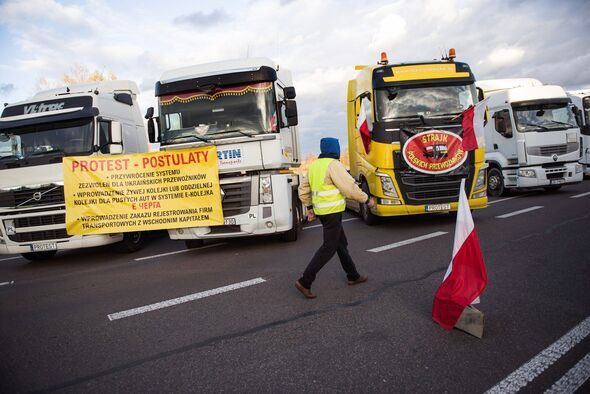Border Blockade: The Unraveling Solidarity Between Poland and Ukraine Amidst EU's Regulatory Dilemmas
In recent developments that have rattled the Eastern European bloc, a border conflict has escalated between Ukraine and Poland, centered around trucking rights and regulations. This dispute has emerged sharply in the wake of a blockade by Polish hauliers, primarily at the Yahodyn checkpoint, a critical juncture for trade between

In recent developments that have rattled the Eastern European bloc, a border conflict has escalated between Ukraine and Poland, centered around trucking rights and regulations. This dispute has emerged sharply in the wake of a blockade by Polish hauliers, primarily at the Yahodyn checkpoint, a critical juncture for trade between the two nations. The blockade has resulted in a backlog of approximately 160 trucks, leading to considerable delays and a simmering diplomatic row.
The contention arises from Poland’s decision to restrict Ukrainian trucks at the Yahodyn passage, a move that seems to defy the European Union’s interim measures aimed at bolstering Ukraine's war-tattered economy. Despite open access at Krakovets and Rava-Ruska crossings, the Yahodyn standoff reflects a deeper unrest among Polish truckers. These hauliers have been vocal about their grievances stemming from the EU's adjustment of transport regulations, which now exempt Ukrainian trucks from permit requirements until June 2024, an extension of the initial relief measures following Russia's full-scale invasion.
The Polish trucking community's calls for a return to the pre-war permit system resonate with a broader concern about fair play and regulatory equity. They also seek tighter controls on transport operations under the ECMT certificates, asserting that the current system undermines their competitive edge.
The economic ramifications of this blockade are profound. Vasyl Zvarych, Ukraine’s Ambassador to Poland, has labeled the situation "a painful stab in Ukraine’s back," a poignant indictment that underscores the urgency and the diplomatic sensitivity of the matter. The disruption in trade due to the blockade bares a significant fault line in the relationship between Poland and Ukraine, countries that have stood in strong alliance, particularly in the face of Russia's aggression against Ukraine.
The friction at the border is a manifestation of a broader challenge—balancing the imperative of economic support for a nation in conflict with the need for regulatory parity for its neighbors. As the blockade impedes the vital flow of commerce, it exposes the delicate nature of international solidarity in times of war and the intricacies of economic interdependence.
This conundrum calls for a nuanced and expedited diplomatic resolution. The objective is twofold: to alleviate the immediate trade impasse at the Yahodyn checkpoint and to ensure the continuation of strong Polish-Ukrainian ties that have become a linchpin of regional opposition to the instability wrought by the conflict in Ukraine.
As the situation evolves, the international community looks on with keen interest, recognizing the potential for this local dispute to reverberate through the corridors of European commerce and diplomacy. The resolution of the blockade will not only be a measure of the resilience of Polish-Ukrainian relations but also a test of the European Union's ability to navigate the complex waters of wartime economic policy and cross-border solidarity.




